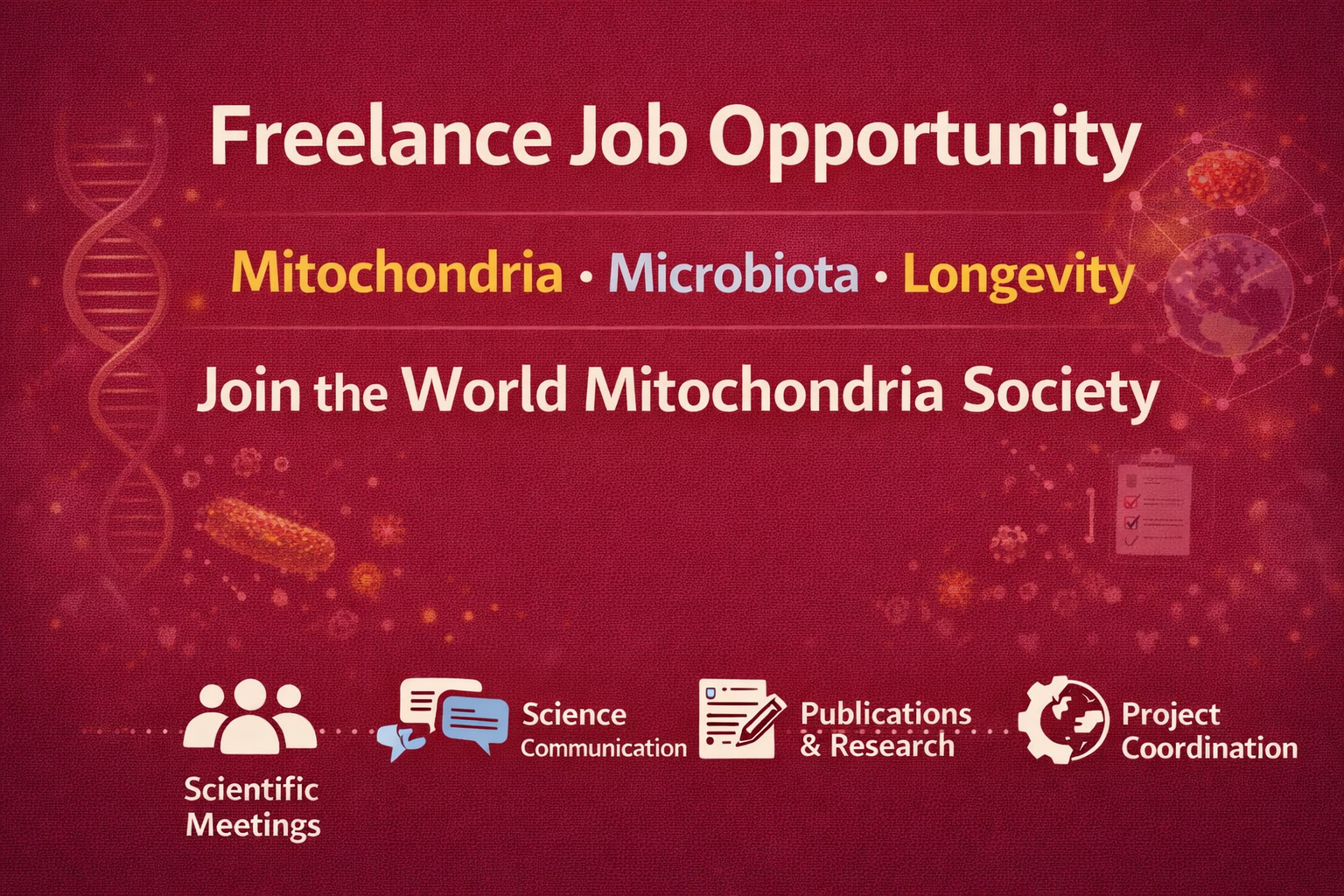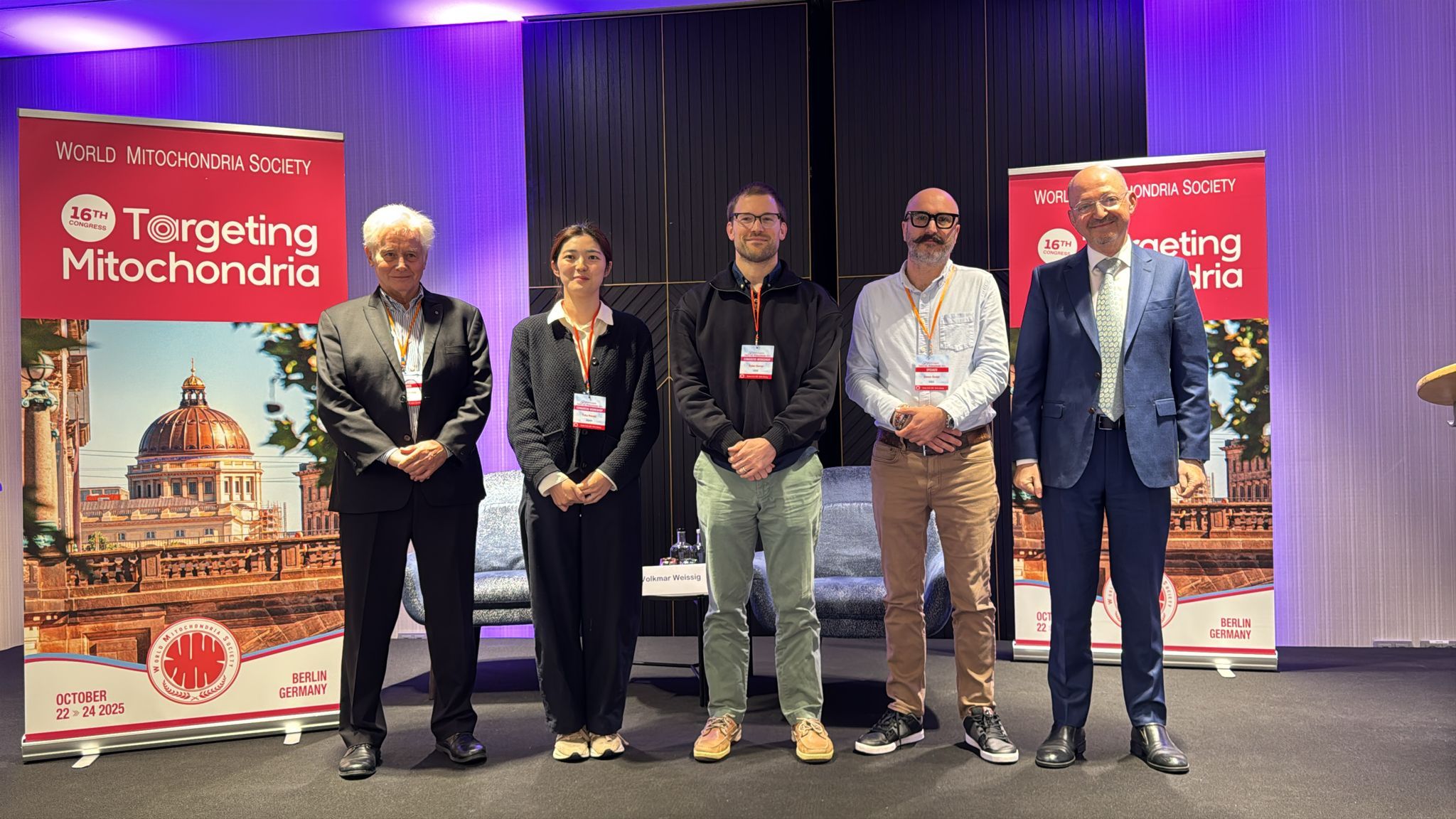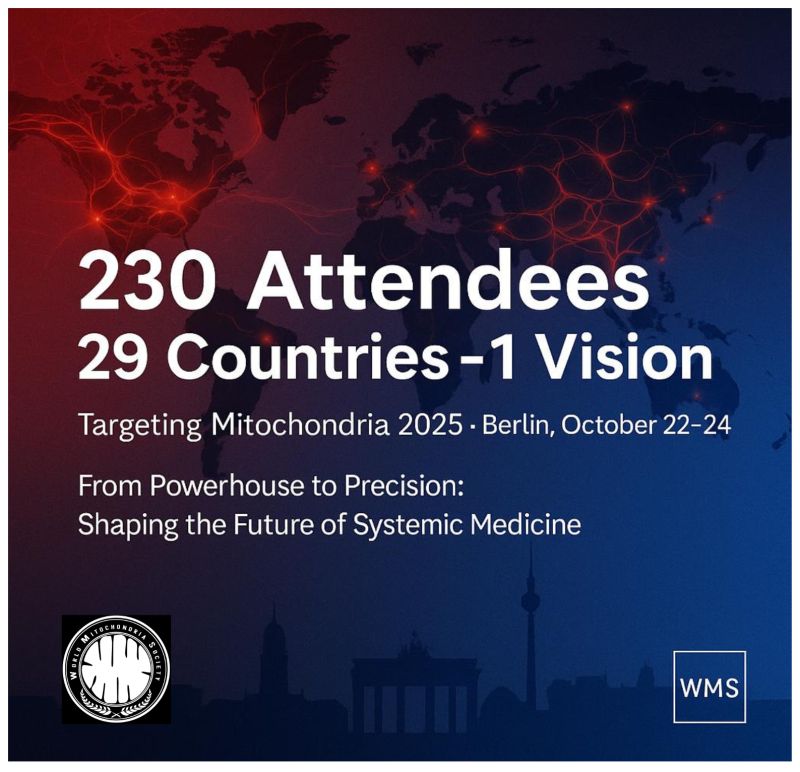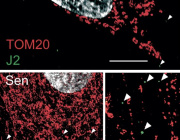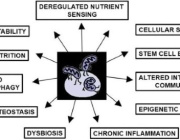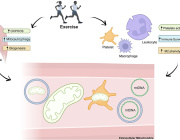Clinical Application of Antioxidants to Improve Human Oocyte Mitochondrial Function: Advances and Perspective
 Dr. Cristina Rodríguez-Varela from Medical Research Institute Hospital La Fe (IIS La Fe) in Valencia, Spain will give a presentation on Clinical Application of Antioxidants to Improve Human Oocyte Mitochondrial Function: Advances and Perspective.
Dr. Cristina Rodríguez-Varela from Medical Research Institute Hospital La Fe (IIS La Fe) in Valencia, Spain will give a presentation on Clinical Application of Antioxidants to Improve Human Oocyte Mitochondrial Function: Advances and Perspective.
Dr. Rodríguez-Varela will discuss the fact that mitochondria are essential organelles in the acquisition of human oocyte competence, as sufficient energy levels are crucial for optimal oocyte maturation, fertilization and subsequent embryo development. In addition, mitochondria constitute the first antioxidant line of defense within the cell, counteracting reactive oxygen species (ROS) derived from its own metabolism. An imbalance between the amount of ROS produced and the capacity of the cell to counteract them leads to oxidative stress, and ultimately to mitochondrial dysfunction. This dysfunction, in turn, impairs cellular functions through reduced ATP output and/or increased oxidative stress. Hence, oxidative stress may be the cause of, or be caused by, mitochondrial dysfunction. Regardless of the origin, this condition gives rise to a vicious cycle with positive feedback, ultimately compromising the overall oocyte quality. Antioxidant therapy has arisen in this context as a new approach aiming to improve human oocyte quality by means of improving, or just protecting, mitochondrial function. In this talk, we will highlight the importance of optimal levels of functional mitochondria in the acquisition of human oocyte competence, and we will give an overview of the main antioxidant supplementation therapies currently under research in our species.
Targeting Mitochondria 2021 Congress
October 27-29, 2021 - Berlin & Virtual Congress
www.targeting-mitochondria.com
Extracellular Mitochondria for Therapy and Diagnosis in Stroke

Dr. Kazuhide Hayakawa, Assistant Professor at Harvard Medical School/ Massachusetts General Hospital, USA will join the Targeting Mitochondria 2021 congress which will be held on October 27-29, 2021 and give a presentation entitle "Extracellular Mitochondria for Therapy and Diagnosis in Stroke".
Recent accumulating findings in cell were provided by Dr. Hayakawa, as well as in animals and humans. These studies suggest that mitochondria maybe surprisingly present in extracellular space andregulatea non-cell-autonomous mechanism in the CNS by mediating injury and recovery. Given that extracellular mitochondria are passively secreted by damaged cells or released from activated cells, it may allow us to look into the metabolic status to diagnose overall disease severity or progress of repair. Moreover, exogenous mitochondrial transplantation may protect neurons in acute CNS injury. Further studies are warranted to carefully assess whether extracellular mitochondria serve as a novel class of biomarkers and whether the putative transfer of mitochondria between cells in the CNS can be leveraged to augment recovery after stroke or neurodegenerative diseases.
Targeting Mitochondria 2021 Congress
October 27-29, 2021 - Berlin & Virtual Congress
www.targeting-mitochondria.com
Big Change from Small Player - Mitochondria Alter Body Metabolism and Gene Expression
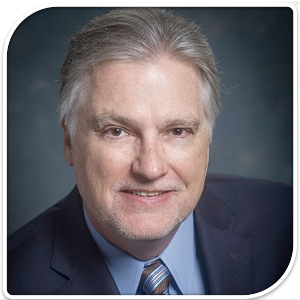 Prof. Scott Ballinger from University of Alabama at Birmingham, USA will be joining the Targeting Mitochondria 2021 World Congress, which will be held October 27-29, 2021 and give a presentation on "Big Change from Small Player - Mitochondria Alter Body Metabolism and Gene Expression".
Prof. Scott Ballinger from University of Alabama at Birmingham, USA will be joining the Targeting Mitochondria 2021 World Congress, which will be held October 27-29, 2021 and give a presentation on "Big Change from Small Player - Mitochondria Alter Body Metabolism and Gene Expression".
Targeting Mitochondria 2021 Congress
October 27-29, 2021 - Berlin & Virtual Congress
www.targeting-mitochondria.com
Mitochondrial Transplantation Therapy, the Recent Advances and Perspective
 Dr. James McCully, from the Harvard Medical School Department of Cardiac Surgery Boston Children’s Hospital, USA, will be joining the Targeting Mitochondria 2021 World Congress, which will be held October 27-29, 2021.
Dr. James McCully, from the Harvard Medical School Department of Cardiac Surgery Boston Children’s Hospital, USA, will be joining the Targeting Mitochondria 2021 World Congress, which will be held October 27-29, 2021.
Dr. McCully will present his recent study on "Mitochondrial Transplantation Therapy, the Recent Advances and Perspective" during the congress.
Dr. McCully’s research focuses on the mechanisms and subcellular localization of the biochemical and molecular events contributing to myocardial cell death. In particular, his lab has investigated the discriminant and/or coordinate mechanisms leading to ischemia/reperfusion injury in the neonate, child, mature and aged male and female with particular emphasis on the development of novel and specific cardioprotective protocols.
Recently he has developed a novel approach to cardioprotection using autologous mitochondrial transplantation. His research has demonstrated that transplantation of autogeneic mitochondria into the ischemic zone of the myocardium during early reperfusion significantly enhances post-ischemic functional recovery.
Targeting Mitochondria 2021 Congress
October 27-29, 2021 - Berlin & Virtual Congress
www.targeting-mitochondria.com
Regulation of Physiological Mitophagy
 Prof. Thomas G. McWilliams from University of Helsinki, Finland will join the Targeting Mitochondria 2021 congress and will present his research on "Regulation of Physiological Mitophagy".
Prof. Thomas G. McWilliams from University of Helsinki, Finland will join the Targeting Mitochondria 2021 congress and will present his research on "Regulation of Physiological Mitophagy".
Key Publications
McWilliams TG*,Prescott AR, Montava-Garriga L, Brooks SP, Singh F, Barini E, Muqit MM and Ganley IG*(2018a)
Basal mitophagy occurs independently of PINK1 in mouse tissues of high-metabolic demand. Cell Metabolism Feb 06; 27(2): 439-449.
McWilliams TG* et al., (+28 Authors) Ganley IG, Suomalainen A, Muqit MMK*(2018b).
Phosphorylation of Parkin at Serine65 is essential for its activation in vivo.
Open Biology. Nov8:180108.
Suomi F & McWilliams TG*(2019)
Autophagy in the nervous system: a primer for neuroscientists.
Neuronal Signaling 3 (3): NS20180134.
Targeting Mitochondria 2021 Congress
October 27-29, 2021 - Berlin & Virtual Congress
www.targeting-mitochondria.com
Mechanism of Membrane-Tethered Mitochondrial Protein Synthesis
 Dr. Antoni Barrientos from University of Miami Miller School of Medicine, USA will give a presentation entitled "Mechanism of Membrane-Tethered Mitochondrial Protein Synthesis".
Dr. Antoni Barrientos from University of Miami Miller School of Medicine, USA will give a presentation entitled "Mechanism of Membrane-Tethered Mitochondrial Protein Synthesis".
The main research interest of their laboratory is on the basic mechanisms that govern the biogenesis of mitochondrial protein complexes in health, disease and aging. They are most specifically interested in the assembly and function of the mitochondrial translation machinery and of the mitochondrial respiratory chain and oxidative phosphorylation system components, involved in biological energy transduction.
The study of mitochondria is now a very “hot issue” for both basic and clinical research. Mitochondria are not only the “energy factories” of the cell but they also house a multiplicity of pathways that serve to regulate cellular life and death. Importantly, mitochondria are involved in prevalent human diseases of wide social impact, most notably neurodegenerative disorders, but also in cancer and the aging process.
Targeting Mitochondria 2021 Congress
October 27-29, 2021 - Berlin & Online
www.targeting-mitochondria.com
Cardiorespiratory Fitness and Mitochondrial Health as Modulators of COVID-19
 Dr. Johannes Burtscher, from University of Lausanne, Suisse will join the Targeting Mitochondria 2021 Congress and will give a presentation entitled "Cardiorespiratory Fitness and Mitochondrial Health as Modulators of COVID-19".
Dr. Johannes Burtscher, from University of Lausanne, Suisse will join the Targeting Mitochondria 2021 Congress and will give a presentation entitled "Cardiorespiratory Fitness and Mitochondrial Health as Modulators of COVID-19".
Dr. Burtscher confirms that some coronaviruses like SARS-CoV-2, the pathogen causing COVID-19, manipulate host cell mitochondria to dodge the host immune defense. We hypothesize that good mitochondrial health, for example due to regular exercise and associated with cardiorespiratory fitness, protects from viral manipulation of mitochondria. Conversely, mitochondrial damage may facilitate viral infection and aggravate the disease. I will summarize the theoretical interactions of SARS-CoV-2 with host mitochondria and provide an overview of recent studies investigating the link between COVID-19 and cardiorespiratory fitness and mitochondrial health.
Targeting Mitochondria 2021 Congress
October 27-29, 2021 - Berlin & Virtual Congress
www.targeting-mitochondria.com
Mitochondrial Arginase-2 is Essential for IL-10 Metabolic Reprogramming of Inflammatory Macrophages
 Dr. Claire McCoy from Royal College of Surgeons in Ireland, Ireland will join the Targeting Mitochondria 2021 Congress and give a presentation about "Mitochondrial Arginase-2 is Essential for IL-10 Metabolic Reprogramming of Inflammatory Macrophages".
Dr. Claire McCoy from Royal College of Surgeons in Ireland, Ireland will join the Targeting Mitochondria 2021 Congress and give a presentation about "Mitochondrial Arginase-2 is Essential for IL-10 Metabolic Reprogramming of Inflammatory Macrophages".
Dr. Claire McCoy graduated in Biochemistry from Trinity College Dublin and completed her PhD at the University of Dundee, Scotland in 2006. Her first postdoctoral position in Innate Immunology was completed at Trinity College Dublin, during which time she was awarded a prestigious Marie Curie International Fellowship. She joined the Hudson Institute, Melbourne as a Research Fellow in 2010 and obtained a New Investigator Project Grant from the NHMRC to continue her work investigating the role of microRNAs in Inflammatory diseases. Claire joined RCSI as the Immunology lecturer in August 2016, where she now leads the growing microRNA Inflammation research group. Claire was the recipient of an SFI Future Research Leader's award presented by President Higgins in January 2018.
Targeting Mitochondria 2021 Congress
October 27-29, 2021 - Berlin & Virtual Congress
www.targeting-mitochondria.com
A session dedicated to Nuclear-mitochondrial interactions and their effect on longevity and health will be organized
A session dedicated to the "Nuclear-mitochondrial interactions and their effect on longevity and health" will be organized by Prof. Miria Ricchetti, Team Stability of Nuclear and Mitochondrial DNA, Institut Pasteur, France, who will chair the session.
Among the speakers:
 Introduction & Presentation of Session Introduction & Presentation of SessionDr. Miria Ricchetti, Team Stability of Nuclear and Mitochondrial DNA, Institut Pasteur, France |
|
|
Targeting Mitochondria 2021 Congress
October 27-29, 2021 - Berlin & Virtual Congress
www.targeting-mitochondria.com
Deciphering strategic interactions between mitochondrial and nuclear genome
 Dr. José Antonio Enríquez from Centro Nacional de Investigaciones Cardiovasculares Carlos III, Spain. Dr. Enríquez will give a presentation entitled "Deciphering strategic interactions between mitochondrial and nuclear genome".
Dr. José Antonio Enríquez from Centro Nacional de Investigaciones Cardiovasculares Carlos III, Spain. Dr. Enríquez will give a presentation entitled "Deciphering strategic interactions between mitochondrial and nuclear genome".
Dr. Enríquez has done probably the most advanced studies on nuclear-mitochondrial interactions and their effect on organisme longevity and health. He focuses on distinct combinations of nuclear and mitochondrial genomes and their effect at the organismal level (lifespan, health condition, predisposition to disease), as well as investigates the underlying mechanism including respiratory complexes and supercomplexes.
Last year he published a seminal paper in Science Advances showing the dynamics of non-pathogenic heteroplasmy (segregation of one of the two mtDNA genomes in different tissues) and their dependence on OXPHOS performance (PMID: 32832682). See also a recent review (PMID: 33369015) on the interactions between mitochondrial and nuclear genome.
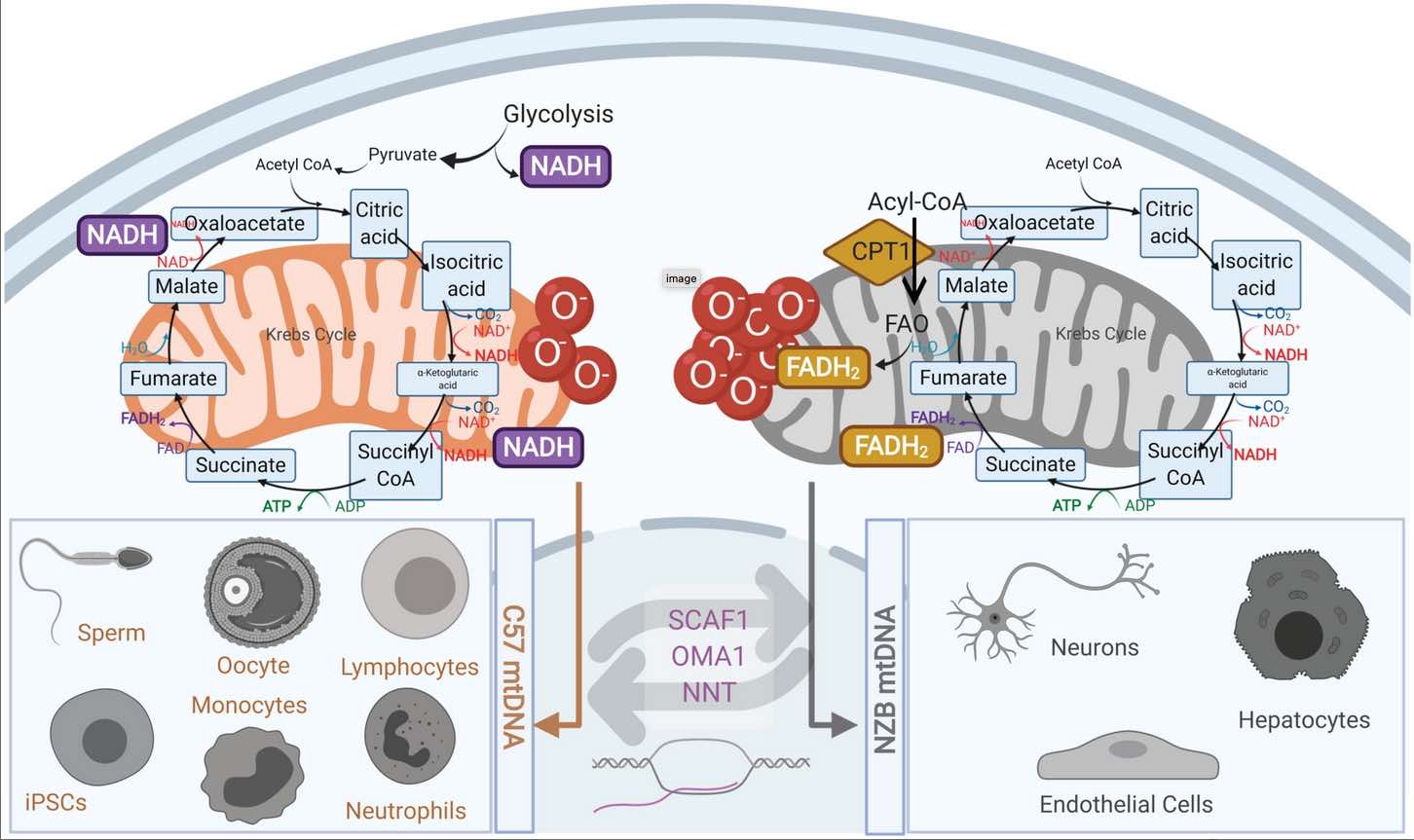
Heteroplasmic mouse models harboring in the same cytoplasm, different non‐pathological mtDNA variants‐haplotypes. MtDNA preference is cell‐type‐specific and not tissue‐specific. Also, the metabolic differentiation program determines the preferred mtDNA haplotype and the mtDNA segregation is driven by functional selection and strongly modulated by the crosstalk between the nucleus and mitochondria. © 2020 The Authors. IUBMB Life
https://doi.org/10.1002/iub.2434
Targeting Mitochondria 2021 Congress
October 27-29, 2021 - Berlin & Virtual Congress
www.targeting-mitochondria.com
Circulating Mitochondrial DNA as an Early Indicator of Severe Lung Disease
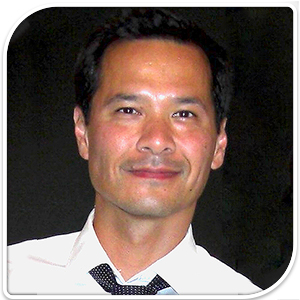 Prof. Andrew E. Gelman from Washington University School of Medicine, USA will give a presentation entitled "Circulating Mitochondrial DNA as an Early Indicator of Severe Lung Disease".
Prof. Andrew E. Gelman from Washington University School of Medicine, USA will give a presentation entitled "Circulating Mitochondrial DNA as an Early Indicator of Severe Lung Disease".
Prof. Gelman will discuss how cell-free mitochondria DNA levels have been used to evaluate the severity of solid organ injury. He will also cover the implications of cell-free mitochondrial DNA findings in several pulmonary diseases including COVID-19. Additionally, Prof. Gelman will talk about the possible tissue origins of cell-free mitochondria DNA and whether it is the result of an overexuberant immune response or a sign of mitochondrial dysfunction.
Targeting Mitochondria 2021 Congress
October 27-29, 2021 - Berlin, Germany & Virtual Congress
www.targeting-mitochondria.com
The Bioenergetics Consequences of Winter Cold in Small Birds
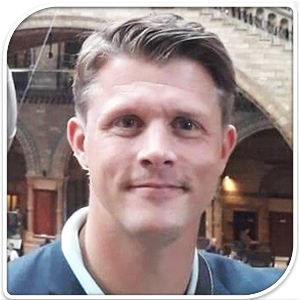 Dr. Andreas Nord, researcher in evolutionary ecology at Lund University, Sweden, will present his study on "The Bioenergetics Consequences of Winter Cold in Small Birds".
Dr. Andreas Nord, researcher in evolutionary ecology at Lund University, Sweden, will present his study on "The Bioenergetics Consequences of Winter Cold in Small Birds".
Dr. Nord highlighted: "Small birds at high latitude face converging energetic challenges in winter, when low air temperature increases the energy cost of staying warm at the same time as short day length and snow constrain refuelling opportunities. The thermoregulatory adaptations that permit existence in such environments are well studied on organismal levels, but analogous processes in the cellular machinery fuelling thermoregulation are poorly understood. In this talk, I will outline how seasonal and diurnal changes in mitochondrial function interact with whole-animal physiology to help birds stay warm when it is cold".
Please follow this link to read detailed news on his research.
Targeting Mitochondria 2021 Congress
October 27-29, 2021
Berlin, Germany & Virtual Congress
www.targeting-mitochondria.com
Glucose Metabolism Control of T Cell Immunity
 Prof. Ming Li, from Immunology Program, Memorial Sloan Kettering Cancer Center, USA will give a presentation entitled "Glucose Metabolism Control of T Cell Immunity".
Prof. Ming Li, from Immunology Program, Memorial Sloan Kettering Cancer Center, USA will give a presentation entitled "Glucose Metabolism Control of T Cell Immunity".
Prof. Ming Li is a Member of the Immunology Program at Memorial Sloan Kettering Cancer Center and Professor at Weill Cornell Graduate School of Medical Sciences. His laboratory studies immune regulation and its relevance to diseases including cancer. Recent work has focused on the signaling, metabolic, and transcriptional mechanisms of T cell regulation as well as tumor-elicited innate and adaptive immune responses, and how this knowledge can be translated for novel cancer immunotherapies. Dr. Li has received a number of honors including a Howard Hughes Medical Institute (HHMI) Faculty Scholar Award, a Rita Allen Foundation Scholar Award, an American Cancer Society Scholar award and the 2016 American Association of Immunologists (AAI)-BD Bioscience Investigator Award for outstanding contributions to the field of immunology.
Targeting Mitochondria 2021 Congress
October 27-29, 2021
Berlin, Germany & Virtual Congress
www.targeting-mitochondria.com
Exercise-Induced, Mitochondrial-Mediated Cell Death in Arrhythmogenic Cardiomyopathy
 Dr. Stephen Chelko from Department of Biomedical Sciences, Florida State University, USA will join the Targeting Mitochondria 2021 Congress which will be held on October 27-29, 2021 and will give a presentation on his recent work in Science Translational Medicine on the "Exercise-Induced, Mitochondrial-Mediated Cell Death in Arrhythmogenic Cardiomyopathy".
Dr. Stephen Chelko from Department of Biomedical Sciences, Florida State University, USA will join the Targeting Mitochondria 2021 Congress which will be held on October 27-29, 2021 and will give a presentation on his recent work in Science Translational Medicine on the "Exercise-Induced, Mitochondrial-Mediated Cell Death in Arrhythmogenic Cardiomyopathy".
Arrhythmogenic Cardiomyopathy (ACM) is a familial heart disease with a high incidence of sudden cardiac death in the young and in athletes. Reduced penetrance and variable expressivity complicate early diagnosis and management of ACM. More and more evidence on the deleterious impact of exercise in ACM is growing, yet these studies all implicate the arrhythmic risk and/or hemodynamic load on the heart in response to exercise. New evidence demonstrates that endurance exercise leads to mitochondrial dysfunction, ROS generation, and large-scale myocyte death in ACM.
Targeting Mitochondria 2021 Congress
October 27-29, 2021
Berlin, Germany & Virtual Congress
www.targeting-mitochondria.com
Mitochondrial DNA in Cancer: The Overlooked Oncogenome

Dr. Payam A. Gammage from CRUK Beatson Institute, United Kingdom will join the Targeting Mitochondria 2021 Congress and will present a talk entitled "Mitochondrial DNA in Cancer: The Overlooked Oncogenome" during the congress.
Dr. Gammage will discuss the mutations of mtDNA that have been detected in human cancers for some decades, although their impact on the disease has not been clear and any potential role of mitochondrial genetics in cancer has been broadly overlooked. To better understand the role of mtDNA in cancer we repurposed targeted clinical sequencing data to assemble the largest dataset of partially matched tumour-normal mtDNA sequences to date (>40,000 tumours). Using this resource he has, Dr. Gammage defined the pan cancer landscape of mtDNA mutations, demonstrating clear evidence of respiratory complex-specific mutational recurrence and selection alongside the impact of mtDNA mutations on patient survival.
Key Publications
Gorelick AN, Kim M, Chatila WK, La K, Hakimi AA, Berger MF, Taylor BS, Gammage PA, Reznik E. Respiratory complex and tissue lineage drive recurrent mutations in tumour mtDNA. Nat Metab. 2021 Apr 8. doi: 10.1038/s42255-021-00378-8
Jackson CB, Turnbull DM, Minczuk M, Gammage PA. Therapeutic Manipulation of mtDNA Heteroplasmy: A Shifting Perspective. Trends in Molecular Medicine. 2020; 26: 698-709
Gammage PA, Frezza C. Mitochondrial DNA: the overlooked oncogenome? BMC Biology. 2019;17:53.
Targeting Mitochondria 2021 Congress
October 27-29, 2021 - Berlin, Germany & Virtual Congress
www.targeting-mitochondria.com
More Articles...
- Patient-Specific Brain Organoids for Modeling Mitochondrial Diseases
- A Mitochondria-Targeted Caffeic Acid Derivative Reverts Cellular and Mitochondrial Defects in Human Skin Fibroblasts from Male Sporadic Parkinson’s Disease Patients
- Welcome to Targeting Mitochondria 2021
- Online Workshop - How to Evaluate Mitochondria Function ?






